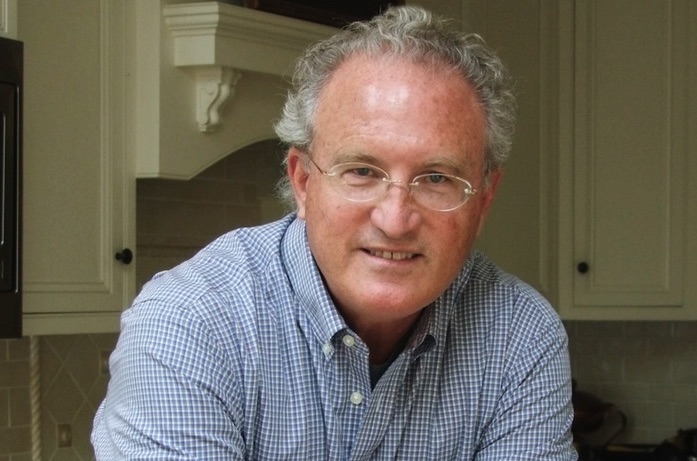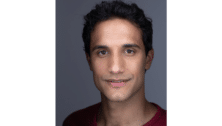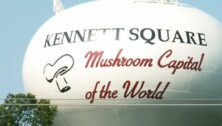Chester County Leadership: Mark Bowden

As he prepares to discuss his last book The Last Stone at the Kennett Friends Meeting at 3:00 PM on February 16th, internationally renowned author and Kennett Square resident Mark Bowden spoke with VISTA Today about growing up as one of eight children in a family that lived in St. Louis, suburban Chicago, Long Island, and Baltimore.
In the conversation, Bowden discusses attending Loyola College in Maryland out of necessity, how his grandmother and father influenced his decision to become a writer, and the most significant break of his career: being hired by The Philadelphia Inquirer in 1979.
The author of 13 books also said that he has a collection of crime stories coming out in the spring, and he shares with readers some of the best advice he’s received in his career.
Where were you born Mark, and where did you grow up?
I was born the third of eight kids in St. Louis, Missouri, in July 1951. After a few years in Missouri, my parents moved my family to the suburbs of Chicago.
What did your parents do?
My dad was an executive for a concrete manufacturing company. He worked in sales, so his job moved our family around a good bit. From Chicago, we went to New York and then to Baltimore.
My mom was a homemaker who had her hands full had with eight kids.
You moved around a lot as a kid. What memories stay with you from growing up?
Each city we lived in represented a different stage of my childhood. I have very fond memories growing up in Glen Ellyn, Illinois, where I spent my early childhood. We would ride our bikes everywhere around the suburban town.
My parents would always tell us to “get lost” but be home by lunch or dinner time.
From there, our family moved to Long Island, which was very different than Glen Ellyn. There were a lot more people. We lived near a marina, with a lot of boats coming and going. I made a lot of friends and learned to fish.
How did you make new friends as your family moved from place to place?
Looking back on it, given that I spent my life putting myself in unfamiliar and unusual places and situations, I think moving around all the time when I was a kid made me more confident around new people or learning a new place. I have always been more naturally social with strangers because of this.
Did you play sports growing up?
I played just about every sport you can name, except they wouldn’t let me play football because I was too small. I played basketball, baseball, soccer, and ran track. I was not great at any sport, but I put in the effort and made each team.
Did you play in college?
I might have tried to play baseball in college, but I was the Editor of my college newspaper, so that took up all of my spare time.
What was your first job, Mark?
I worked on a McCormick assembly line at a plant in Hunt Valley, Maryland. On this job, I would pack lunches for kids at camps. We would pack sandwiches, chips, and cookies in bags, box them, and put them on a truck. The people I worked with helped make the job bearable, but the work itself was pretty mindless otherwise.
What lessons did you learn from working at McCormick that still stay with you today?
My father always stressed that because people were paying me, I owed them my complete commitment. He wanted me to be on time, be focused, and be respectful. I’ve always tried to follow his advice.
My father lost his job when I was in high school, and I remember the conversation we had the day he came home to tell us. I think what he impressed on me was the nature of your relationship with an employer. It’s great as long as they need you or want you, and when they don’t, you’re on your own.
Did you write at all in high school?
I was known for caricatures in high school! I drew cartoon drawings of our teachers, and my friends would Xerox and pass them around.
When did the writing bug bite?
I always enjoyed reading and writing, and my parents always encouraged me to write.
My grandmother taught writing in a correspondence class. I remember our parents would make us write our grandparents’ notes, thanking them for gifts, and telling them what we were doing.
After one specific letter I sent my grandmother was I was in middle school, she wrote back that she loved my note and went on to explain why she loved the letter so much.
My grandmother’s feedback showed me that I was good at writing and also that writing was something you could work at and improve.
Where did you go to college, Mark?
With eight children siblings, there wasn’t much money to go around for college. We were restricted to finding a school near home that we could live at home, get a scholarship, and work to obtain money for tuition. I ended up going to Loyola College in Baltimore.
For the first year, I lived at home but eventually got an apartment near campus with some classmates.
While in college, I worked at Pantry Pride, a local supermarket, as a cashier. Pantry Pride paid well for a part-time job and provided health benefits as well.
What was it about Loyola that drew you there?
Loyola was close to home, had an excellent reputation as a Liberal Arts school, and was a Catholic university. Our family is Catholic, so my parents were happy to see me at a Catholic college.
Looking back, was Loyola a good choice for you, Mark?
I went to Loyola out of necessity but came to love the school. I liked it because it was a small school where I got to know my professors. At Loyola, Jesuits and lay teachers were very much a part of my life. I formed friendships with many of them, one of whom I’m still friends with today.
What kind of music were you listening to back then?
I am a real big Beatles guy. They became very popular as I turned nine or ten years old, right as I began listening to music. Their music gave me an appreciation for country-rock music, including James Taylor, The Birds, Crosby Stills, Nash & Young, and Simon & Garfunkel.
I learned to play the guitar around this time and still play today.
As you look back over your career, who gave you a break?
I mentioned my grandmother, who wasn’t necessarily looking to shape me into a writer but whose feedback and encouragement had a real influence on me.
I have to mention my dad, although he always wanted me to go to law school because he wasn’t sure a writer could make a living writing books or newspaper articles. Eventually, after a few successful books, he came around to the idea that I could make a decent living telling stories.
Years later, he told me he was wrong about a few things, including Vietnam, because he was in favor of the war; Nixon; my ability to earn a living as a writer; and the Beatles!
The most significant impact on my life outside of my family had to be Tom Scheye at Loyola, the professor I mentioned earlier.
I hadn’t written much before entering Loyola, but each freshman was required to take a composition test. If I passed the test, I could skip Freshman composition course. This was a dreaded class because students had to write an essay every week. I took the test and passed.
After I passed, I went to see my faculty advisor, Tom Scheye, and he said I’m going to give you one piece of advice, you should take the class because I teach it, and I can make you a better writer. I followed his advice and took the class. He did, in fact, turn me into a serious writer.
Tom has been a friend and mentor ever since. In fact, I dedicated my first book to him!
Another person who had an impact on my career is Morgan Entrekin. Morgan is my Editor and owns the publishing house – Grove Atlantic – that publishes my books.
Back in the 1990s, I had written and published two books, each of which were sold only to members of my family. From there, I decided I would write a book that would interest me, and probably no one else called Black Hawk Down.
The book was turned down by every major publisher in New York. Morgan liked and bought the story. He did an amazing job editing and marketing Black Hawk Down that he and I remain, partners, even today.
I also have to mention Gene Roberts, who hired me at the Philadelphia Inquirer in 1979. Gene is one of the great figures in modern American journalism. Gene hiring me was easily the most significant career break in my life. I turned down a job at the Washington Post so that I could come work for Gene at the Inquirer.
Like so many other journalists at the time, I wanted to be a creative writer and work for a paper that encouraged journalism and creative writing. Gene hired me and then gave me one great opportunity after another. He enlarged my ambition for myself.
What did Gene see in you, Mark?
He believed that I was both a good reporter and a good writer. He gave me opportunities to develop as both. It wasn’t just me. He did this for quite a few journalists working for him at the Inquirer.
Unlike other editors, he was very open to letting his reporters follow their leads. He was curious to see what we would come up with. You could do things at the Inquirer that you’ve never really seen anyone do, and Gene would say, “let’s run it.”
What are the priorities and opportunities that you’re working on and focused on at the start of the new year?
Right now, I’m between projects. To date, I’ve written thirteen books. I have a collection of crime stories that is coming out in the spring, so I will have to do travel and promotions for that.
I have deliberately not plunged into the next book. I’d like to take some time for myself. This may be the first time in my entire writing career that I’m taking a break. I’m 68 years old and can slow down my pace a bit. I’d like to see what topics I gravitate toward before deciding on my next book.
I’ve enjoyed a great deal of reading in my free time. I was recently elected to the school board in Kennett Square but had to resign because I moved a few blocks out of the Borough and no longer lived in the district I was elected to represent. I joined the Board for the Kennett Education Foundation, which raises money and awards grants and scholarships in the Kennett school district.
I’m writing an essay right now about Truman Capote’s “In Cold Blood,” a book that greatly influenced me. That essay might be the first in a series of essays about books that have had a large impact on my work.
Why In Cold Blood?
It’s an example of how you can write non-fiction in a way that is so compelling that it rises to the level of literature. Even though that book is flawed from a reporting point of view, it is powerful and beautifully written. It was an early sign to me that the things I imaged doing were doable.
Another book that influenced me because it was one of the first that I read along these lines is The Electric Kool-Aid Acid Test by Tom Wolfe. I eventually became friends with Tom and some other very notable writers that I admired as when I started out. I was lucky enough to have many of my heroes become my friends.
What do you do in your free time?
I picked the guitar up after a forty-year hiatus and am currently taking lessons, which I very much enjoy. I read a lot and my wife and I take trips to visit our children and grandchildren.
Finally, Mark, what is the piece of advice you’ve ever received?
I would say Tom Scheye’s advice to take the comp class even though I didn’t have to. In this class, Tom introduced me to George Orwell and his essays. It was a tremendous course of study where I thought hard about what made great writing. Tom taught me how important it is to organize my thoughts and express them clearly and what a difference doing so can make in the world.
The other bit of advice that guided my professional life came from Gene Roberts, who always told us to “zig when everyone else zags” when covering a story. In journalism, the great herd of reporters are always covering the same story the same way. He preferred that we look for something else to cover that no one else was covering. If we were covering a story everyone else was covering, he encouraged us to take a different angle.
If you look at my books, most are stories that wouldn’t exist in our popular imagination if I hadn’t decided to write them. There are so many wonderful stories off the beaten track out there. Writers and journalists should be driven by personal curiosity rather than what they think people want.
Publisher’s Note: Laura Wagnoner contributed to this profile.
Connect With Your Community
Subscribe to stay informed!
"*" indicates required fields








![95000-1023_ACJ_BannerAd[1]](https://vista.today/wp-content/uploads/2023/03/95000-1023_ACJ_BannerAd1.jpg)







































